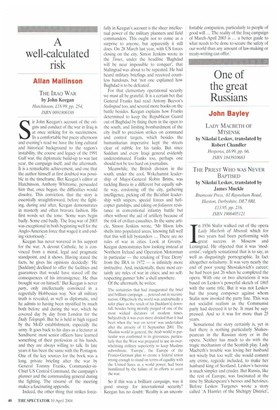A well-calculated risk
Allan Mallinson
THE IRAQ WAR by John Keegan Hutchinson, £18.99, pp. 254, ISBN 0097800188 Sir John Keegan's account of the origins and conduct of the war in Iraq is at once striking for its succinctness. In a comfortable but pacey afternoon and evening's read we have the long cultural and historical background to the region's instability, the course and legacy of the 1991 Gulf war, the diplomatic build-up to war last year, the campaign itself, and the aftermath. It is a remarkable achievement, and one that the author himself at first doubted was possible in the timeframe. But Keegan's editor at Hutchinson. Anthony Whittome, persuaded him that, once begun, the difficulties would dissolve. This conviction, that the story is essentially straightforward, before the fighting, during and after, Keegan demonstrates in masterly and often bravura fashion. His first words set the tone: 'Some wars begin badly. Some end badly. The Iraq war of 2003 was exceptional in both beginning well for the Anglo-American force that waged it and ending victoriously.'
Keegan has never wavered in his support for the war. A devout Catholic, he is convinced from a moral, legal and pragmatic standpoint, and it shows. Having stated the facts, he gives his opinions decidedly: 'He [Saddam] declined to offer the facilities and guarantees that would have staved off the consequences of his intransigence. He thus brought war on himself.' But Keegan is never party, only intellectually convinced in a regretfully flobbesian way. Not all military truth is revealed, as well as diplomatic, and he admits to having been mystified by much both before and during the war, which he covered day by day from London for the DaiO) Telegraph. But he is held in high regard by the MoD establishment, especially the army. It goes back to his days as a lecturer at Sandhurst: most senior officers have learned something of their profession at his hands, and they are always willing to talk. In late years it has been the same with the Pentagon. One of the key sources for the book was a long, private briefing after the war by General Tommy Franks, Commander-inChief US Central Command, the campaign's planner and the commanding general during the fighting. The résumé of the meeting makes a fascinating appendix.
Indeed, the other thing that strikes force fully in Keegan's account is the sheer intellectual power of the military planners and field commanders. This ought not to come as a surprise to anyone, but apparently it still does. On 28 March last year, with US forces closing on the city, Simon Jenkins wrote in the Times, under the headline 'Baghdad will be near impossible to conquer', that Stalingrad was about to be repeated. He had heard military briefings and received countless handouts, but 'not one explained how Baghdad is to be defeated'.
For that elementary operational security we must all be grateful. It is a certain bet that General Franks had read Antony Beevor's Stalingrad too, and several more books on the battle besides. Keegan explains how Franks determined to keep the Republican Guard out of Baghdad by fixing them in the open to the south, and limiting bombardment of the city itself to precision strikes on command and control targets, which besides the humanitarian imperative kept the streets clear of rubble for his tanks. But since Saddam and every Iraqi general evidently underestimated Franks too, perhaps one should not be too hard on journalists.
Meanwhile, the British division in the south, under the cool, Wykehamist leadership of Major-General Robin Brims, was tackling Basra in a different but equally subtle way, cordoning off the city, gathering intelligence, picking off the I3a'athist leadership with snipers, special forces and helicopter gunships, and taking on fedayeen resistance in conventional infantry battle but often without the aid of artillery because of the risk of civilian casualties. In the same article, Simon Jenkins wrote, 'Mr Hoon lobs shells into populated areas, knowing full well that this will kill bystanders ... There are no rules of war in cities. Look at Grozny.' Keegan demonstrates how looking instead at Northern Ireland and Operation Motorman in particular — the retaking of 'Free Deny' from the IRA in 1972 — is infinitely more instructive. And, incidentally, there most certainly are rules of war in cities; and no selfrespecting gunner 'lobs' a shell anywhere.
Of the aftermath, he writes:
The certainties that had inaugurated the brief
and brilliant campaign petered out in recrimination. Objectively the world was undoubtedly a safer place as the result of his [Saddarn's] downfall, besides being morally purged of one of the most wicked dictators of modem times. Subjectively it was even more divided than it had been when the 'war on terror' was undertaken after the atrocity of 11 September 2001. The Muslim world in general, the Arab world in particular was confirmed in its grievances, particularly that the West was prepared to use its overwhelming military superiority to keep Muslims subordinate. 'Europe', the Europe of the Franco-German plan to create a federal union strong enough to stand on terms of equality with the United Sates as a world power, had been humiliated by the failure of its efforts to avert the war.
So if this was a brilliant campaign, was it good strategy for international security? Keegan has no doubt: 'Reality is an uncom fortable companion, particularly to people of good will The reality of the Iraq campaign of March-April 2003 is ... a better guide to what needs to be done to secure the safetyof our world than any amount of law-making or treaty-writing can offer.'


































































 Previous page
Previous page